In 2015 we honored:
Sgt Jose Rodela (Medal of Honor recipient),
Tom Contrera (insurance, risk management),
Dr. Paul Saenz (sports medicine),
Judith Loredo, Ph.D. (from a learning disability to a doctorate in education),
Doug Cross (banker, home builder, investor), and
Ambassador Oliver Garza (U.S. Ambassador to Nicaragua, 1999-2002).
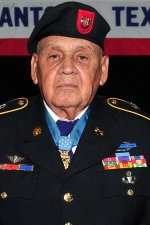
Sergeant Jose Rodela
Medal of Honor
As the eldest of 12 children, Master Sergeant Jose “Joe” Rodela was born into leadership. Growing up in Corpus Christi’s La Quarenta neighborhood, he attended Zavala Elementary School, Driscoll Middle School, and Roy Miller High School. Joe worked throughout his school years: at Luby’s and other restaurants during the winter and in the fields during the summer.
According to Joe, La Quarenta also housed a street gang of the same name. “My mother knew that if [my siblings and I] were working and staying in school, we wouldn’t have time to get into trouble,” he recalls. He never became involved in the gang. After 10th grade, Joe left school at age 17 and, in 1955, enlisted in the Army, where he remained for 20 years.Joe was sent to Korea and helped clear landmines along Korea’s 38th parallel. Sadly, tragedy struck during this assignment. It had been wintertime, and the soldiers had set up a 55-gallon barrel to keep warm. They had burned wood the first day, then poured gas into the barrel the second day. They hadn’t realized the barrel was resting on a landmine, which activated with the added weight of the gas. That day, Joe lost three friends.
After Korea, Joe attended “Jump School” and joined the 101st Airborne Division. He continued training and transferred to Special Forces—the famous Green Berets.
On Sept. 1, 1969, Joe—then Staff Sergeant Rodela—served as a Special Forces trainer and commander of a company of Cambodian Montagnard soldiers in Vietnam. On that fateful day, Sergeant Rodela and those under his command had been maintaining a defensive perimeter to keep the remaining battalion from being overrun. When the enemy attacked, Sergeant Rodela responded by repositioning his troops, moving from post to post under heavy fire. Although he suffered wounds, Sergeant Rodela continued to provide suppressive fire and support while his troops successfully repelled the enemy. He also knocked out an enemy rocket position. For his actions that day, Sergeant Rodela received the Medal of Honor in 2014.
Joe believes that courage comes from one’s mission. “In combat, your mission is the man on your right and the man on your left,” he explains. “You take care of them, and they take care of you. No one is left behind.”
Sergeant Rodela demonstrates a remarkable dedication to God and his country. He and his friend Alex—Alejandro Flores—both served as Special Forces A-Team leaders in Vietnam as well as Colombia and other South American countries.
Today, Joe and Alex visit San Antonio ROTC units, presenting awards to outstanding cadets. These two elite, experienced soldiers serve as tremendous role models for the ROTC students.
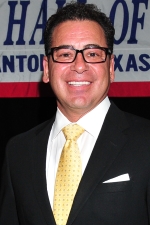
BUSINESS
Tom Contreras
Insurance, Risk Management
Once Tom Contreras learned determination early in life, he could not be barred from achieving his goals.
Tom grew up in South San Antonio. He attended Price Elementary School, where he discovered that he possessed a flair for math in fourth grade. He then attended Dwight Middle School and enrolled in South San Antonio High School for his freshman year. He played baseball and football, demonstrating athletic skill.
But with no precedent in his family for college attendance, Tom faced no expectations of college in his future. He saw this reinforced by the well-intentioned but faulty “realistic” advice imparted to the children in his schools: “You’re not smart enough, you’re not big enough to play college sports,” etc.
“But when people told me that, it fired up the grit in me,” Tom recalls. “I was determined to prove them wrong.”
Tom experienced a turning point when he followed his father, a former Marine, to Laredo. While on a hunting trip, he befriended United High School students. His newfound friends hailed from backgrounds with greater financial resources and different expectations for their futures. Notably, they all intended to go to college. As part of their circle, Tom determined that he’d also go to college. Additionally, Tom discovered golf, which he chose to pursue over baseball and football. No matter Tom’s goals, his father always signed on to help and encouraged Tom to do his best.
After high school, Tom completed his first year of college at Laredo Community College. From there, he planned to attend The University of Texas at San Antonio. But after playing a round of golf with a St. Mary’s University acquaintance, Tom was encouraged to consider St. Mary’s and try out for the St. Mary’s golf team. He visited the campus and experienced St. Mary’s small, tight-knit community, which sparked his wish to attend St. Mary’s after all. As always, his father supported him, assuring Tom that they’d “figure it out.”
Tom and his wife Leti attended St. Mary’s in the mid-1980s. After graduating from St. Mary’s, the Contreras family launched a successful career in insurance and risk management. A few years later, Tom enrolled at Our Lady of the Lake University and earned his MBA. Throughout Tom and Leti’s career, they have remained steady supporters of St. Mary’s as well as the Archdiocese of San Antonio, the Oblate School of Theology, and St. Mark the Evangelist Catholic Church.
Recently, Tom and Leti donated $1.12 million to rebuild the St. Mary’s pub. The two fondly remember the pub as the center of the St. Mary’s community. They hope to offer that experience to the current community. Additionally, Tom and Leti have given St. Mary’s the resources to build a first-class golf team.
Tom’s golfing talent has passed down to the couple’s two children: their son Chris and their daughter Kelly. While Leti doesn’t play golf, she loves the game and supports her family’s involvement in the sport. Chris played golf at Rice University for two years, then transferred to St. Mary’s to finish his BBA in finance and continue playing golf; he is currently making the PGA Mini-Tours while exploring a professional career. Kelly is currently a sophomore studying at St. Mary’s and achieving much success on the golf team.
Tom and Leti will soon celebrate their 25th anniversary and look forward to a bright and successful future, for which they thank the opportunities given them by higher education.
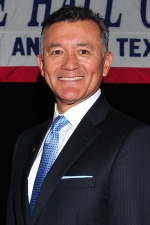
ATHLETICS
Paul S. Saenz, DO
Sports Medicine
When the All-American St. Mary’s University basketball player Ricky Hooker drove Dr. Paul Saenz to the school he wanted to name for the famous “jock doc,” Paul was right at home. As kids growing up near the Northside of San Antonio, Paul and his buddies used to ride their bikes all over the city; it was safe to do that back then. On a hot day, they would hide their bikes in the bushes around Concordia Lutheran Church and School, wait until no one was looking, and then dash into the building for an ice-cold drink from the water fountain.
When Paul started playing Little League, he practiced baseball on the Concordia fields. The Concordia building is now home to the Dr. Paul S. Saenz Junior High School, which is part of the School of Excellence in Education. Ricky Hooker is now the superintendent.
Ricky’s concept for the Dr. Paul S. Saenz Junior High School was to name it after a living individual the students could look up to, a person students might meet and relate with. Paul fits that bill nicely.
With two older sisters and one younger sister, Paul was the only boy in his family. His parents enrolled young Paul at St. Mary Magdalen School, and he continued his Catholic education for the next 16 years of his life, graduating to Central Catholic High School, then St. Mary’s University. Paul’s father was the first child in a family of nine siblings to attend college, graduating from the College of Pharmacy at the University of Texas. Paul’s mother Frances was also fully committed to making sure her children understood one significant truth: Education is the key to success.
Paul wanted to grow up to be like his father, so he worked alongside him in the pharmacy. But his father had different ideas.
“He wanted me to go beyond that. He was always pushing me to go farther,” says Paul.
Paul was an athlete at Central Catholic, lettering in baseball, football and track. While there, he met Rebecca, a cheerleader from Incarnate Word High School. The high school sweethearts got married and raised three sons, educating all three of them in Catholic schools.
As they matriculated through St. Mary’s, Paul planned to become a dentist, and he enrolled at the School of Dentistry at the University of Texas Health Science Center at San Antonio. After two years, however, he realized he’d made the wrong career choice and transferred to the Texas College of Osteopathic Medicine at the University of North Texas Health Science Center. There, Paul met Dr. Wayne English and discovered sports medicine.
“I realized that, wow, if I can’t be a professional athlete, then the next best job [is] taking care of professional athletes. And the dream came true,” says Paul.
Paul returned to San Antonio and started working with USA Boxing. He treated Jesse James Leija, Robert Quiroga, and Alex Rios—all the guys that were making careers in boxing. Paul started his practice, Sports Medicine Associates of San Antonio, and gathered a team of partners.
“I have been blessed in my career, and—I say this honestly with humility—I don’t think there’s another physician in San Antonio that has had the opportunity to experience the diversity of practice that I have had,” says Paul. Throughout his career, Paul has treated football players, dancers, Cirque du Soleil members, basketball players, baseball players, Barnum & Bailey Circus trapeze artists, and ballerinas. “I don’t know what end of the spectrum of professional athletes…I have not been involved with. I can’t imagine drawing it up any better. It’s all in God’s hands.”
Along the way, Paul has been on the sidelines of many high school games, serving as team doctor to Southwest High School and Central Catholic. At Southwest, Paul met Ricky and Marvetta Hooker, whose daughters, Marshevet and Destinee, are Olympians and now professional track and field athletes. Marshevet is a world-class sprinter, and Destinee is a high jumper and volleyball player. It’s quite possible, according to Paul, that Destinee was the best volleyball player in the world at the time of the last Olympic Games.
Paul believes that faith has made him what he is today. “I was raised in a faith-based environment,” he says. “I may not have noticed at the time that my environment was shaping me as a young man…that faith and God was always in [my life] from the time I started first grade all the way through college. That’s 16 years of theology, of religion, year after year. I think that as I’ve become [a] mature man, I realize where my principles are and what organizations I devote my extra time to and my philanthropy to… It’s a result of all the upbringing.”
Paul gives back into the next generation. He and Rebecca have served as gala chairs for Hope for the Future, an Archdiocese program that provides financial assistance to families who want their children to attend Catholic schools. The Saenz family has served Central Catholic High School, and Paul takes his responsibilities with the charter school very seriously.
The next generation of Saenz athletes is already making its presence known. Nick, the oldest son, is working on his master’s degree while coaching basketball at Central Catholic; he has his sights on a professional coaching career. Stephen, the middle son, is following in his father’s footsteps by studying medicine at the University of Texas Health Science Center; he will soon do a residency at Sports Medicine Associates of San Antonio. Stephen’s residency isn’t unusual. Our local jock doc’s practice has been a meaningful part of sports medicine students’ educations for 20 years. The youngest son, Jeff, will enter law school in August 2015.
The knowledge that one is going to pursue higher education becomes an article of faith that pushes one through. Paul received that gift from his parents and God at an early age. All of his decisions that followed—such as doing his homework and staying out of trouble—were the result of that commitment and faith upheld by Dr. Paul Saenz, his family, and his teachers.
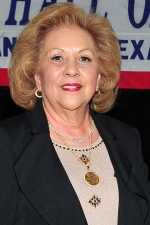
Ph.D.EDUCATION
Judith G. Loredo, Ph.D.
From a Learning Disability to a Doctorate in Education
Throughout her extensive schooling, Judith Gutierrez—now Dr. Judith Loredo—was told she couldn’t possibly succeed.
Judith was an only child. Her father Jimmy Gutierrez was a high school dropout. Late in life, however, he was accepted into St. Mary’s School of Law. Eventually, he would serve as justice of the peace for downtown San Antonio. Judith would never forget her father’s tenacity. Read More
At the end of Judith’s third-grade year, a teacher told Judith’s mother that Judith couldn’t read and would have to repeat the grade.
Judith’s mother replied, “She can read. I’ll teach her.”
Judith’s mother Juliette worked in the Bexar County Child Support Office. Mothers would come in on Friday to ask whether they had checks waiting for them; if they didn’t, they’d leave not knowing how they were going to feed their children. Witnessing this made Juliette determined to see Judith graduate from college and live independently.
That year, Judith and her mother traveled to the library nearly every day during the summer. By the time she started school in the fall, Judith could read anything put in front of her—that is, she could stand up and read the words out loud perfectly. However, she had no idea what the words meant.
Much later, Judith would discover she had a learning disability, which was largely ignored by her teachers in her elementary and secondary schools. While she could sight-read, she couldn’t process the words. She found math and science difficult, and she was told in high school that she was “too stupid” to attend college.
Writing also posed a challenge, as Judith realized in an English course at San Antonio College (SAC). Her papers would be returned to her with more red marks scrawled across them than Judith’s own black ink. Yet, the professor didn’t tell Judith what she was doing wrong. Judith passed the course with a D, but a D wouldn’t transfer to a four-year college. So Judith retook the course—with a different professor who had the patience to explain her errors.
While at SAC, Judith saw a sign promoting the Speech Pathology Program and decided to travel that path in her journey toward success. The Speech Pathology Program helped her discover that she had an inability to comprehend the words she was reading; at the same time, she discovered her talent for expressing her thoughts through speech.
Once Judith pinpointed her challenges, she explored them through her studies and took action to overcome them. From then on, she’d study by reading the words out loud into a tape recorder and then listening to the tapes. To write her papers, she’d record her analyses and then transcribe the tapes. By following these practices, Judith succeeded in earning her bachelor’s degree in communication disorders and two master’s degrees—her master of arts in speech pathology and her Master of Education—from Our Lady of the Lake University.
Judith taught in San Antonio’s Edgewood Independent School District for a number of years before moving into educational administration. She also instructed young teachers at Huston-Tillotson University, where she became Dean of Academic Affairs. She worked to make a difference by developing innovative programs and leading teachers toward understanding that some students have unique learning styles that need to be accommodated.
Judith pursued that truth through a number of administrative positions, which culminated in her application to the Cooperative Superintendency Program for her Ph.D. at the University of Texas at Austin’s Department of Educational Administration. Some of Judith’s peers discouraged her, saying 20 years would pass before a woman would be named superintendent of a Texas school district.
However, Judith had three UT mentors who helped open the doors for her to succeed. And the young woman who couldn’t write when she started college submitted a 499-page dissertation, which she wrapped in a gold box with a gold bow and presented to her parents.
Five months before she crossed the stage to receive her doctoral degree, Judith was named superintendent of the Southside Independent School District—the first women ever to be superintendent of a Texas school district. Shortly after her appointment, a woman named Sammie Kerby—the deciding vote in Judith’s election—told Judith, “You had better succeed because every woman in Texas is riding your coattails.”
After serving as superintendent for several years, Judith moved on to work on education statewide, spreading the truth she represented by her journey. Drawing from her path to success, Judith imparts the following advice: “You find the people who believe in you. You find your talents, and you use your talents to minimize your weaknesses. Keep moving forward, and you will find people who will open doors for you. Never give up.”

SPECIAL RECOGNITION
Doug Cross
Banker, Homebuilder, Investor
Doug Cross realizes he’s led a charmed life, and he’s paid every blessing forward.
Doug’s parents purchased a home near the corner of Fresno and San Pedro in 1947 when Doug was 18 months old. His father traveled extensively, representing the Fraternal Order of Eagles until Doug was 10. Before her marriage, Doug’s mother had earned her bachelor’s degree and worked as a teacher. According to Doug, she was “one of the kindest, most wonderful people you could ever meet”—someone who saw the good in everyone.
From kindergarten through his undergraduate career, Doug attended Catholic schools. Two of his older brothers often helped him with his schoolwork; they were good role models for Doug. When Doug reached 10 years of age, his father bought a Texaco Station. Doug’s business education started at this Texaco gas pump, as he worked there until he was 15.
Doug attended Central Catholic High School, which he considers a formative experience for him. He describes his Central Catholic teachers, mentors, and coaches as smart and caring individuals, and he credits the school with providing him a quality education. Later in life, Doug would eventually serve as Chairman of the Board of Directors for Central Catholic.
“The bonds you make at Central hold for life,” says Doug.
After high school, Doug studied physics at St. Mary’s University. In his senior year, he initially thought he’d be moving to Dearborn, Michigan, for a job with Philco-Ford after his graduation. However, one of Doug’s good friends worked for Northside State Bank in San Antonio and had asked Doug to apply for a job there. While working part-time at the bank, Doug was asked by his boss Louis Nelson to stay permanently after the loss of another employee. Although Doug had little to no experience in banking, his boss said, “I know banking. I’ll teach you.” And he made Doug an offer too good to refuse.
Doug remained in banking for seven years and loved it. “It was so much fun…to help people grow their business[es] and watch them thrive,” he says.
During his banking career, Doug was approached by one of his customers in the homebuilding business with a different job offer. Although Doug had no experience in the homebuilding business either, his customer hired him to work with Shepherd & Burris Homes, where Doug stayed for two years. After that, Doug founded his first business, Liberty Homes, building thousands of homes between 1975 and 1987. In 1987, Doug founded Gemstar Construction Co., which grew into a service business and evolved into AAA Auger in 1994.
AAA Auger proudly has its roots in the fair treatment of its employees. From the start, Doug and his business partners vowed that all AAA Auger employees would have livable wages. Doug recognizes the strong work ethic of the employees. The lowest-paid employees—coming straight out of high school—earn at least $35,000 a year. Within a few years, these employees learn and grow, and they can earn $50,000 to $75,000 a year.
“That way of doing business creates loyalty, inspires hard work, and makes the business successful,” explains Doug.
In 2004, Doug spread the AAA Auger model across the region, and became president and CEO of Zulu Investment Corp., which licensed the AAA Auger trademark and system in Austin, Dallas, Ft. Worth, Houston, San Antonio, and Tulsa. In 2013, Doug transitioned to CEO Emeritus of AAA Auger in San Antonio.
All that anyone has ever done for Doug Cross has come back to serve our community. Doug is a powerhouse, serving as a Development Board Member of the Hope for the Future Fund, as Chairman of the San Antonio Lighthouse for the Blind’s 2015 Leadership Advisory Council, and as an Advisory Board Member of both the Bill Greehey School of Business and the School of Science, Engineering and Technology at St. Mary’s University, among many positions.
“I have always had an older person in my life,” says Doug, citing his family, the monks at Central Catholic, and Louis Nelson among his mentors. “Now I’m an older person, and I want to give back.”
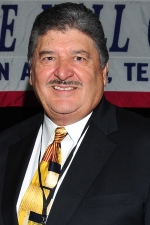
PUBLIC SERVICE
Ambassador Oliver P. Garza
U.S. Ambassador to Nicaragua (1999-2002)
Born in Poteet, the strawberry capital of Texas, Ambassador Garza’s fondest memories were of starting life in a neighborhood filled with his mother’s family. A sister was next door, her parents (maternal grandparents) resided a few doors down, and a brother lived down the block. Many people of Ambassador Garza’s generation grew up that way. The extended family, not all over, but right out your doorstep. This tradition carried him to high school at San Antonio Tech High School, before it changed to Fox Technical High School.
Of course, there were no plans of formal education beyond high school. But by a fluke, Ambassador Garza took a course in journalism. The teacher kept hounding the students in the class. There were only three.
So the Ambassador shares: “Actually, it was a student teacher, and Mr. Castillo kept bugging us about college. No one was interested, no one had money, but he insisted, ‘What are you going to do after graduating?’ Well, I listened and enrolled in New Mexico Western University, where Mr. Castillo showed up as a graduate student.”
It was a great experience, but Ambassador Garza missed home, so he dropped out and returned to San Antonio.
Ambassador Garza began working at USAA in the print shop. Shortly after, he realized he really did need to complete college, so he enrolled in SAC. He worked during the day and weekends at USAA and attended school the rest of the time. He even went to work with the Parole Office so he could go to school full-time during the day and work at night. The Ambassador found work with SANYO (The San Antonio Youth Organization), a community organization founded and headed by Father, now Bishop John Yanta. However, Ambassador Garza was always passed up for promotion because he did not have a college degree.
Eventually, he made it to St. Mary’s, where he worked in the Admissions office with a program called Upward Bound. This program was designed to bring low-income kids into the college environment. With a wife and three children, Ambassador Garza finally graduated. His first job after graduation was as Director of Admissions for St. Mary’s. That job opened the door to his next career change.
In facilitating visits from many different agencies, Ambassador Garza decided to try a new and entirely different job arena: the US Foreign Service. He applied and was accepted, and off he went to his first assignment in Quito, Ecuador. He briefly worked for the DEA, but that job was just a little too dangerous and too “exciting” for him. So he sought to get back into the Foreign Service. Eventually President Bill Clinton named him Ambassador to Nicaragua.
When he was passed over for the Ambassador’s job in Colombia, he decided it was time to retire. Or, should we say, open the door to a new phase of his professional career. Ambassador Garza returned to Texas and accepted a position with the LBJ School of Public Affairs. In addition to teaching, he was a recruiter for students like he had been back in his high school and college days.
His professional journey took him back to the State Department, where he represented the US in the United Nations General Assembly, and then to a real hardship assignment as the US representative to the Human Rights Commission in Geneva, Switzerland. He completed his final tour of duty with the State Department as an advisor to the president of Honduras.
Ambassador Garza’s story is a long and winding road, but it shows that the impression you make on people makes a difference in your life. He says:
“Sure, life has its share of luck, but sometimes you have to make luck happen—you have to look ahead and see what you will get out of the next decision you make, what added value you’re going to get. I learned that the people you meet, the people you can give your time and effort to can come back and help you when the time comes. It takes some chutzpah, but you have to step up and walk through the door when you see it.”

